
The Free Press

Twenty-five years ago, my friend Rabbi Daniel Gordis and his family packed up their house in Los Angeles and immigrated to Israel. Those were the days when there were still people who believed in the Oslo peace process, the Israeli left was a force to be reckoned with, and much of Israel’s phenomenal growth had yet to happen. That was the year of the Jewish state’s 50th anniversary.
Much has changed since then. The peace process with the Palestinians is dead—as is much of the Israeli left. Yet Israel has made peace with countries that would have been unthinkable not a decade ago. And the country’s now known as the start-up nation, an economic powerhouse famous for its high-tech scene.
On the occasion of Israel’s 75th anniversary, marked this May week, I reached out to Danny to help make sense of this complicated, tumultuous, beautiful, often indecipherable place: How did the Jewish people manage to pull this off after two in every three European Jews had been slaughtered? What does he consider Israel’s greatest achievement? Its greatest failure? In light of ongoing political turmoil, what does he expect a 100th year to look like?
There are few Israelis today better suited to answer those questions than Danny—rabbi, academic, American-Israeli, and the author of eight books, including the just-published Impossible Takes Longer: 75 Years After Its Creation, Has Israel Fulfilled Its Founders’ Dreams?
We’re thrilled to publish an essay based on that important new book below—and to have him on this week’s episode of Honestly:
Seventy-five years ago this week, the art museum in the young city of Tel Aviv—which then had less than 200,000 inhabitants—was packed for an unusual ceremony. The Jewish community of Palestine (known as the yishuv) was about to perform a resurrection: 36 men and one woman were about to sign Israel’s Declaration of Independence, ending almost 2,000 years of Jewish homelessness, and reestablishing political sovereignty in the Holy Land for the first time since the destruction of the Second Temple in 70 CE at the hands of the Romans.
There is a brief film clip of David Ben-Gurion—the man who had led the yishuv for more than a decade and would soon become the new state’s first prime minister—proclaiming with a tremulous voice, “We hereby declare the establishment of a Jewish state in the Land of Israel, to be known as the State of Israel.”
Those who have heard that clip dozens of times may well have never asked themselves what might seem an obvious question: Why is it that we only hear the “We hereby declare” portion of Ben-Gurion’s reading the Declaration aloud? Why not the rest? And nothing else from the proceedings?
The only moving picture camera around belonged to a cinematographer who owned a company that produced weekly newsreels. At the last minute, the government-in-waiting commissioned him to film the momentous occasion, but he had only four minutes of film in stock to cover a ceremony that was expected to last a half-hour—there was not enough film to record a moment that would alter the history of the Jewish people, and in some ways, much of the world.
Ben-Gurion therefore arranged to signal him at the most important points in the proceedings to indicate when the camera should roll. After the ceremony, though, the new state’s press handlers cut up the film into four parts and sent them out to various news agencies for use in newsreels. As a result, less than a minute of the original movie survived in Israel.
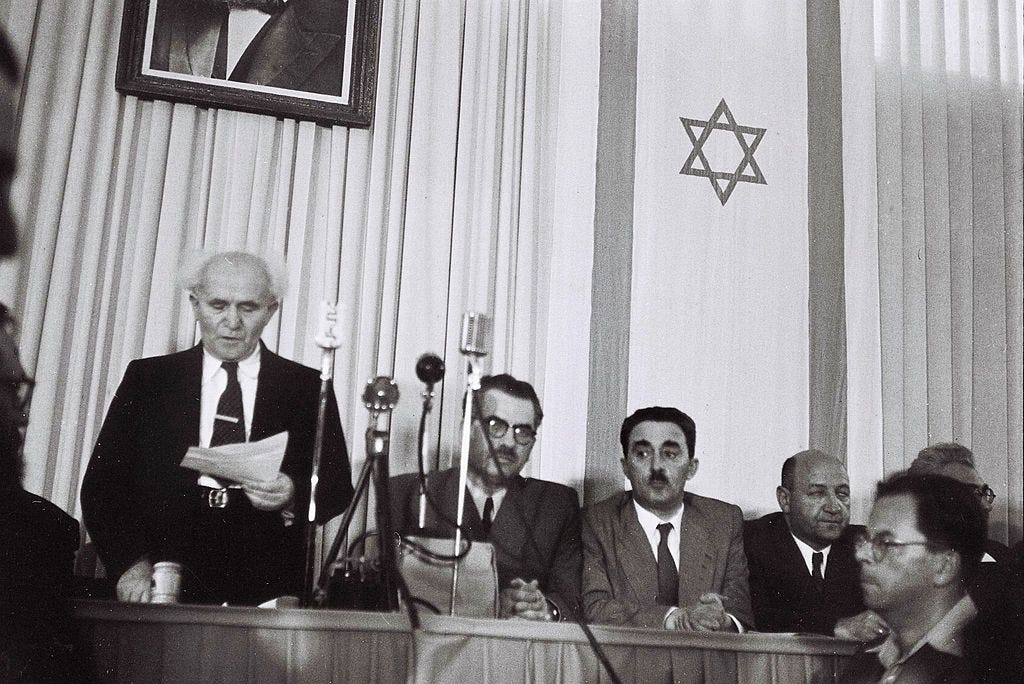
In many ways, that little story is a metaphor for Israel itself in those early days. That the cinematographer was contacted only at the last minute highlights the haste and cobbled-together nature of everything that transpired in those fragile weeks. The meager four minutes of available film reflected the scarcity felt everywhere in the country about to be born. That most of the film was sent abroad reflects Israel’s early need to tell its story and to justify itself—so much so that there was little footage for the new country to keep for itself.
Scarcity was hardly the nascent country’s only problem: even in the immediate aftermath of the Holocaust, international support for the creation of a Jewish state was tepid at best.
Just six months earlier, in November 1947, the United Nations General Assembly had voted—by the slimmest of margins—to create two states in Palestine, one Jewish and one Arab. A majority of two-thirds was required, and in the days leading up to the vote, it was far from certain that the Zionist delegation had the votes.
Today, it is virtually impossible to recapture the tension in the room. The vote took only three minutes, but what was at stake was nothing less than the future of the Jewish people. Resolution 181, commonly known as the “Partition Plan,” passed—but barely. The vote was 33 in favor, 13 opposed, and 10 abstentions. Matters would soon get more ominous: on April 3, Sir Alan Cunningham, then serving as the British high commissioner to Palestine, wrote in his weekly intelligence briefing, “It is becoming generally realized. . . that the United States [sic] aim is to secure reconsideration of the Palestine problem by the General Assembly de novo.” Merely four months after the vote, before Israel even existed, the United States was spearheading a move to undo the resolution. But Harry Truman, sensitive to the potential electoral costs of reversing the U.S. position, at first wavered but then stood by America’s original stance in favor of partition.
Both the Jews and the Arabs in Palestine were disappointed by the borders the UN allocated to them, but while the Jews agreed to the plan, the Arabs rejected it. They made clear that if a Jewish state was created, they would attack it. When, six months after the UN vote, in May 1948, the British were about to depart Palestine, the leadership of the yishuv had to decide whether to act on the UN’s endorsement of the idea of a national home for the Jewish people and declare statehood. There was nothing easy about the decision. If they did not declare independence, the opportunity might never return. If they did, five neighboring Arab states had vowed to annihilate them.
On May 12, 1948, the yishuv’s leadership asked Yigael Yadin—later a leading archaeologist but at the time, the commander of the yishuv’s military forces—what their chances were of surviving the onslaught that would follow if they declared independence. “Fifty-fifty,” Yadin responded. Just three years after the liberation of Auschwitz, attempting independence might result in yet another slaughter.
Two days after they asked Yadin that question, on May 14, Ben-Gurion read the Declaration of Independence aloud at the Tel Aviv Museum. Israel was born—and war did follow. Almost immediately, the armies of Lebanon, Syria, Jordan, Egypt, and even Iraq (which did not share a border with the new state) attacked Israel from every direction.
As expected, the conflict was brutal. Approximately one percent of the civilian Jewish population died (in the United States today, that would be 3,600,000 people). Hundreds of thousands of Arabs were pressured to leave in some cases, and in others, expelled outright; they became refugees, and would never return. Ultimately, though, Israel was not defeated. It expanded its borders beyond what the United Nations had allocated, emerging from the war with borders at least marginally defensible. And tragically, because the Arabs rejected the UN proposal and declared war, the Arab state that the UN had voted to create never came to be.
When the war ended in early 1949, Israel had survived. It was poor, overwhelmed by a massive flood of Jewish refugees from Europe, militarily far from secure, rejected by the Arabs, and far from embraced by the international community. It was an inauspicious beginning, to be sure. But the citizens of the young country did not need to think too far back to know what would happen if they failed. So, in what is one of humanity’s most astonishing stories of national rebirth and flourishing, they held on against all odds, and step by step built the country that Israel is today.
This month, with Israel celebrating 75 years of independence, Israelis and the world are taking stock of what has and has not been accomplished since May 1948. In many ways, what has transpired seems virtually miraculous—those black-and-white images of a ragtag country created in the aftermath of the Holocaust have given way to brightly colored images of a modern, thriving country pulsing with life, creativity, and energy that bears scant resemblance to the country Israel was not long ago.
Militarily, the fledgling army that barely held on in the 1948 War of Independence (and again, in the early days of the 1973 Yom Kippur War) has become a military power so overwhelming that no Arab army has dared attack Israel in the last half-century. Slowly but surely, much of the Arab world has come to accept Israel’s existence. Egypt signed a peace treaty with Israel in 1979; Jordan followed in 1994. The UAE and Bahrain followed with the Abraham Accords in 2020, and then came Morocco and Sudan. More recently, Saudi Arabia and others have been making overtures toward some form of normalization.
Economically, the accomplishment has been no less extraordinary. In its earliest years, Israel was out of money, and had no way to feed or house the hundreds of thousands of Jewish displaced persons making their way to the young state from DP camps in Europe after the Holocaust, or the approximately 700,000 Jews from Arab lands who were essentially expelled from North Africa and who then also came to Israel. There was mandatory food rationing and poverty was rife. In the 1950s, an Israeli’s standard of living was approximately that of an American in the 1800s. Though German reparations (equivalent to about $8 billion today) in the 1950s helped Israel avert economic disaster, the specter of economic collapse would reappear. In the 1980s, the annual rate of inflation was 445 percent, and again, Israel seemed on the verge of financial doom.
Today, those challenges, too, are gone. Privatization of national companies and better fiscal policy (credit for both of which goes largely to Benjamin Netanyahu) saved the economy, which is now robust. Today, Israel’s high-tech sector is so powerful that only three countries other than the U.S. have more companies registered on the NASDAQ.
The rebirth of the Jewish people in its new state extends far beyond the easily measurable such as military or economic indicators. The Jewish people in Europe were sick, early Zionists had said. Jews were fearful. They were commonly banished. They were excluded from many elite professions. But much of the sickness was internal, too. What kind of people do not speak their own language? Could there be authentic Russian culture without the Russian language? French culture without French?
Eliezer Ben-Yehuda thus took it upon himself to revive ancient Hebrew and transform it into a modern language. Today, the millions of Israelis who speak the language of the Bible take it so for granted that they do not realize that an Israeli bookstore, with hundreds of linear feet of shelves of books written in a language that not long ago virtually no one spoke, is miraculous. Israel is home to some 55 theatrical companies that put on over 1,000 plays a year that are seen by some three million people (in a country of nine million). Israel has 84 recognized orchestras and ensembles that present tens of thousands of performances a year. There are 163 museums, visited by some seven million people a year. The Israeli film industry, long a rather sad and unproductive story, now releases some 60 films a year, some of them world-class. Israeli publishing houses release about 8,500 volumes a year—mostly in Hebrew.
Two months ago, Israel was ranked fourth in the UN’s latest World Happiness Scale (way higher than the U.S., which was #15 on the list). Only three Scandinavian countries ranked higher. The Jewish state has a higher birth rate even among secular Jewish women than any other OECD country.
Why the happiness? Why the birth rate? Perhaps because Israel has eradicated heartbreak as the foundational characteristic of Jewish life.
From its outset, Zionism had been a political movement designed to bring about a state that would breathe new life into a people that had barely staggered out of the first half of the twentieth century. Its goal was to fashion a Jewish people that would no longer wait to see what history had in store for them, but instead would shape their own destiny. Those people who assembled in the Tel Aviv Museum on May 14, 1948 were there to begin transforming that dream into a reality.
Has Israel succeeded? Has it lived up to its founders’ dreams? If what it sought to do was to create a new Jew, Zionism has succeeded beyond measure.
Seventy-five years later, however, many of the issues with which Israel grappled in its earliest days remain unresolved and are now the foundations of some of the country’s most serious challenges. The Arabs who fled Palestine but refused to recognize Israel are today’s Palestinians. David Ben-Gurion’s decision not to draft young ultra-Orthodox (Haredi) men—because he was convinced that ultra-Orthodoxy was a remnant of European Judaism that would soon disappear—now exempts more than 11,000 young men a year and threatens the very foundations of the image of the IDF as a people’s army. And though the Declaration of Independence promised that Israel would pass a constitution, that never happened—a decision that has led Israel to the gravest internal crisis in its history.
The most glaring disappointment of the past 75 years, the source of much of the world’s opprobrium regularly directed at Israel, is the ongoing Israeli-Palestinian conflict, which just this week erupted once again into warfare.
Sadly, time does not heal all wounds. Indeed, the passage of time sometimes hardens hearts. Among Israeli voters, support for a two-state solution was at its highest in 2007, when it peaked at 70 percent. But it has fallen since then. In 2018, according to the Israel Democracy Institute, 46 percent supported a two-state solution, while in 2021 that number had fallen to 41.5 percent. Among the Palestinians, the numbers are even less encouraging. One highly regarded polling organization found in early 2022 that 32 percent of Palestinians favored a one-state solution, 52 percent favored continued armed resistance, and 58 percent were explicitly opposed to a two-state solution.
Tragically, there is no solution in sight.
But if, several months ago, most Israelis on the eve of the celebration of 75 years of independence might have pointed to the ongoing conflict as their biggest source of disappointment, what now has them most concerned is the deepest—and, many believe, the most dangerous—internal divide in Israel’s history. This time, the crisis is not about Israel and its hostile neighbors, but disagreement among Israelis themselves about the kind of country the Jewish state should be.
When Israelis went to the polls for the fifth time in three years on November 1, 2022, bringing Benjamin Netanyahu (now Israel’s longest-serving prime minister) and the right back to power, the new Justice Minister, Yariv Levin, began to push forward a legislative plan to dramatically alter Israel’s judicial system. Levin and his partners claim that it is time to defang Israel’s Supreme Court, which under Chief Justice Aharon Barak in the 1990s had taken for itself vast power.
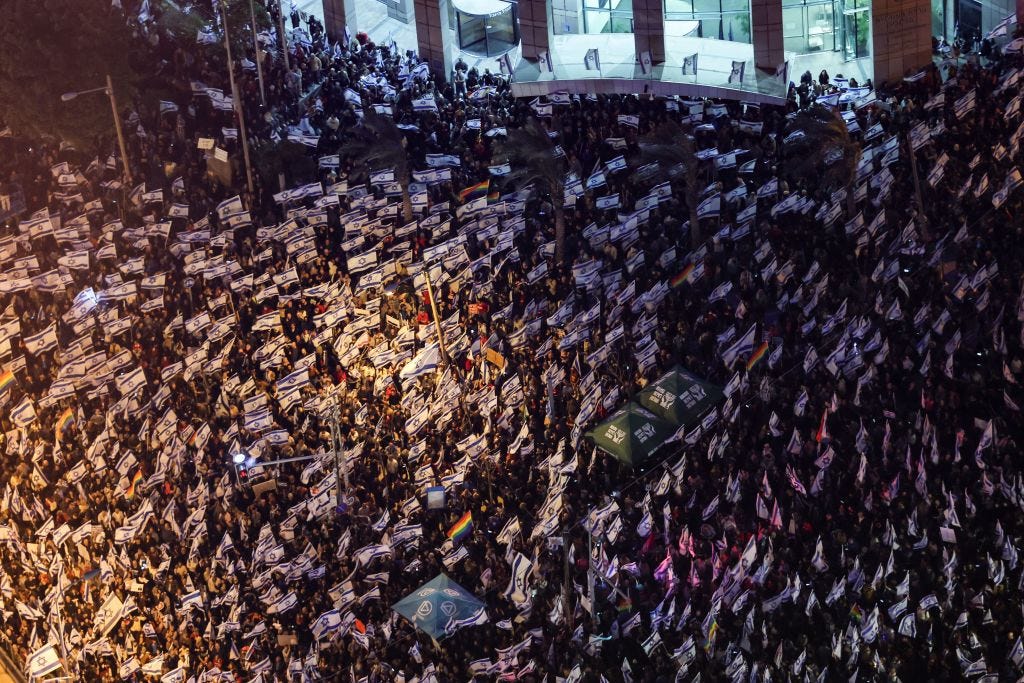
Yet many Israelis on the left and in the center (and, by now, many on the center-right as well), believe that what was being proposed was not judicial reform, but regime change. The planned changes, they argued, would render Israel either a non-democracy, or at best, an illiberal democracy like Poland or Hungary. Unlike many first world democracies, Israel has a unicameral parliament, rather than two houses that might push back on each other. To make matters even more worrisome, the executive and legislative functions are already blended in the Knesset itself. Therefore, the proposal that the Knesset (rather than an independent committee, as is now the case) would select judges and that judicial review by the Supreme Court would be ended led many Israelis to fear that the “reforms” would effectively end all checks and balances in Israel’s governmental system.
If the government had expected the opposition to grumble but then to let the reform pass, they badly miscalculated.
Young Israeli professionals, long assumed to be nonchalant about the Zionist project of their grandparents and great-grandparents, took to the streets by the hundreds of thousands, waving tens of thousands of Israeli flags, demanding an end to the proposed reforms. They blocked highways. Reserve IAF pilots refused to show up for training and missions, even as matters with Iran are heating up. Hundreds of Israel’s leading economists warned the government that these reforms would essentially ruin Israel’s economy, and soon enough, Bloomberg, Moody’s and others had downgraded Israel’s ratings. Israeli high-tech companies began moving their assets abroad. All the military, economic, and diplomatic progress Israel had made through the decades seemed to be slipping through the country’s fingers.
So far, the massive social protests—which have been held for the past 16 consecutive weeks in more than 100 locations, bringing more than 200,000 people to the streets on a given Saturday night—have managed to delay the judicial reforms. But the proposed legislation remains very much on the table, and the rifts within Israeli society that it has surfaced have brought Israel to the precipice. A number of Israeli journalists and intellectuals could not help but note that when the United States was 75 years old, it was gearing up for its Civil War.
But the crisis Israel now faces has also underscored the power of the dream that fueled the creation of the Jewish state. To have participated in these protests, as I have with my family, has meant bearing witness to an extraordinary exhibition of love of country, of devotion to Zionism, of almost completely violence-free protests by hundreds of thousands of people for three months. What we have seen is (whatever little bit remains of) the left, along with the newly reenergized center, joined by many on the right who were so deeply worried about the split in the nation that they, too—though they favored the reforms—said it was time to end the legislative push, not because the idea of reform was wrong, but because the way the government was ramming it through was tearing the country to shreds. These protests have had a single symbol: the Israeli flag. “We love this country as much as you do,” said the left and the center to the right. “And it’s ours no less than it is yours.”
“All they want is to code, go public, have exits,” it was said of this younger generation of secular Israelis who live right where the Declaration was signed in 1948. “Their Zionist-pioneer grandparents and great-grandparents must be turning in their graves,” people said.
But no. Not at all. Those Zionist-pioneer grandparents and great-grandparents must be staring down at their kids’ kids with proverbial tears of pride and joy, a deep sense of satisfaction that three quarters of a century in, the young, successful, secular Ashkenazi elites love this country. They took to the streets to defend it, to protect it, to preserve it.
What will Israel be like in 25 years, when it reaches its 100th anniversary? We cannot know, of course. But one great source of hope is that what is emerging in Israel is a newly energized political center. A wide swath of Israeli society that wants Israel to be Jewish and democratic, both universalist and particular, at home in both the West and in the Middle East.
That desire to be both deeply Western and profoundly Jewish at the same time was apparently at the core of David Ben-Gurion’s decision not to include the word “democracy” in Israel’s Declaration of independence. “As for western democracy, I’m for Jewish democracy,” he wrote in his diary. “ ‘Western’ doesn’t suffice. Being a Jew is not simply a biological fact, but. . . also a matter of morals, ethics. . . . The value of life and human freedom are, for us, more deeply embedded thanks to the biblical prophets than western democracy.”
That was good as far as it went, but the absence of a constitution has left many critical questions unanswered. How Jewish should the Jewish state be, and how should it be Jewish? How much power should the Supreme Court (still seen as a bastion of secular elitism) have? How much power should be wrested away from the secular descendants of the Ashkenazi (European) founders, now that the more traditional and reverential Jews of the Levant (Mizrahim) constitute a majority of Israel’s Jews?
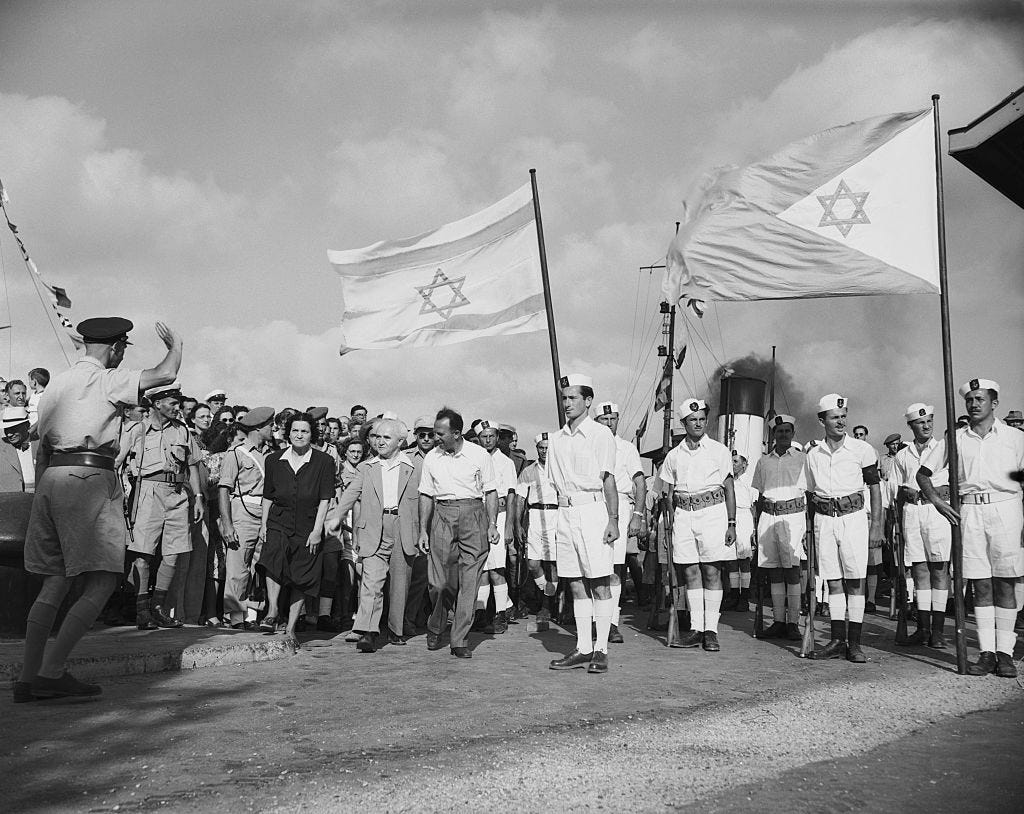
Our family—my wife, our three kids, and I—moved to Israel from Los Angeles 25 years ago. Why? We wanted, quite simply, to be part of the story of a young country that was going to write the future of the Jewish people. Life here has been wondrous at times, but frightening and overwhelmingly sad at others. Israel has at times infuriated us, and at times it has inspired us. Never, though, have we ever second-guessed our decision to move to Jerusalem, for even a second. After all, no one in the history of Zionism believed that reviving Jewish life and building a sovereign state where the “new Jew” could flourish was going to be easy. After 2,000 years of homelessness, re-creating a home was bound to be a messy affair.
The story of this state, as both the occasion of the 75th anniversary as well as the current crisis remind us, is far from finished. We will not live to see it completed. All we can do—and what we feel compelled to do—is nurture this home against all odds, so that 75 years from now, our descendants are still proud of what has been wrought, and are still wrestling with what kind of place this should be.
There has been so much written about the protests and Israel’s 75th anniversary. Here are just a few pieces we’d recommend:
For a very different view of the protests, read an essay we published recently by Moshe Koppel and Eugene Kontorovich: Our Think Tank Sparked Mass Protests in Israel. We Proudly Stand By Our Ideas.
We also were provoked, as always, by Tablet’s Liel Leibovitz, this time writing for Newsweek: What Israel’s Protests Are Really About
And of all the essays capturing the deeper meaning behind what’s happening in the streets, we were struck by the insights of David Hazony in the Jewish Journal: The Rebirth of Israel?
And to support more of our work, giving you the smartest perspectives on the news, become a Free Press subscriber today:

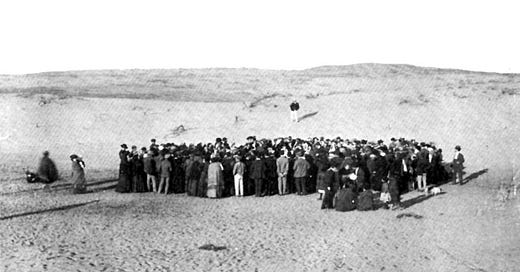



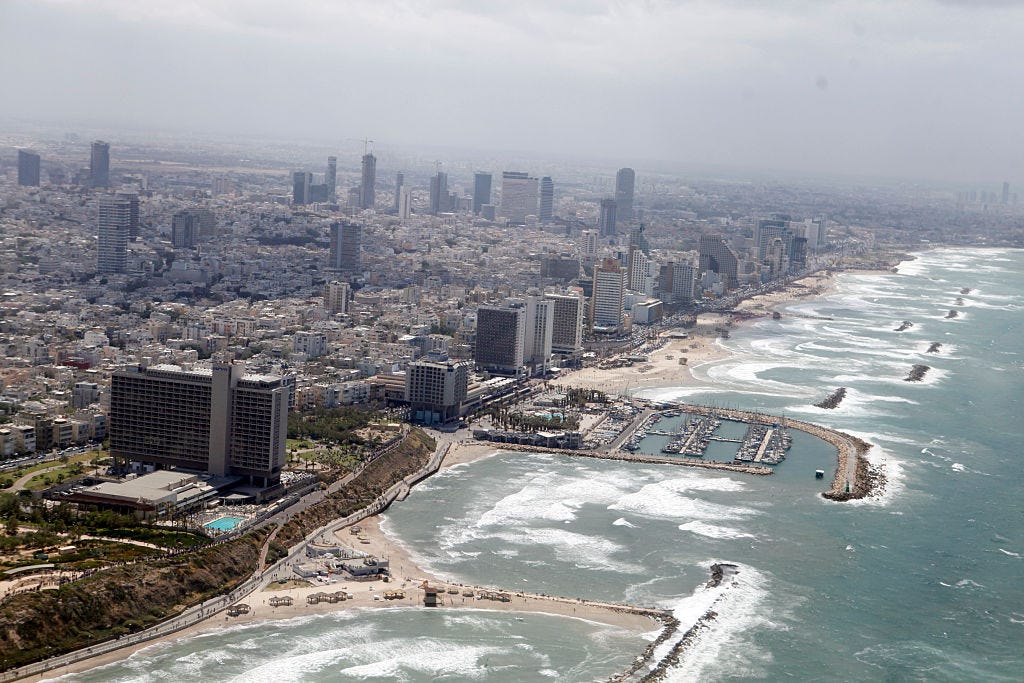




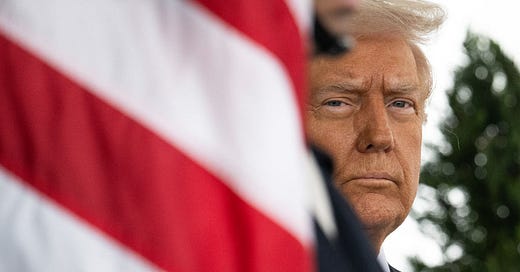

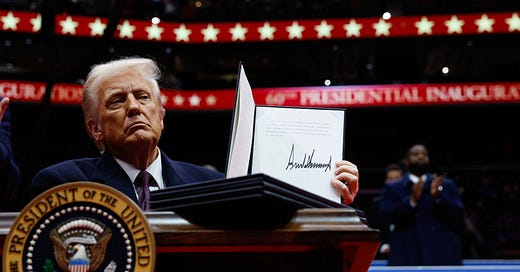


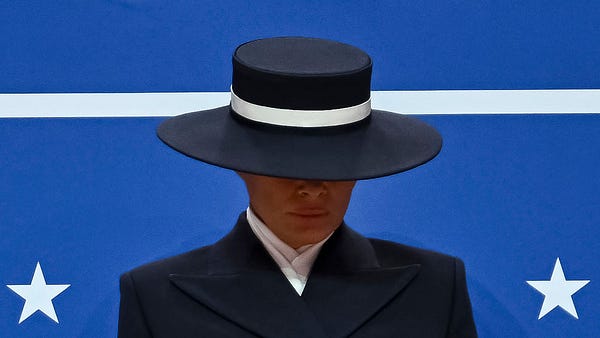


As in America, it is the privileged elites who are driving reform. Gordis admits as much: "...the young, successful, secular Ashkenazi elites love this country. They took to the streets to defend it, to protect it, to preserve it." What Gordis does not admit in his essay is that Supreme Court members are self selecting.
We are fortunate to have a Constitution with three separate branches of power and a bicameral legislature. We have had bad Supreme Court decisions but the court does not have carte blanch to overrule Congress or vice versa. I'm not convinced that Israel won't overcome its current crisis and continue as a beacon of freedom and democracy in the Middle East.